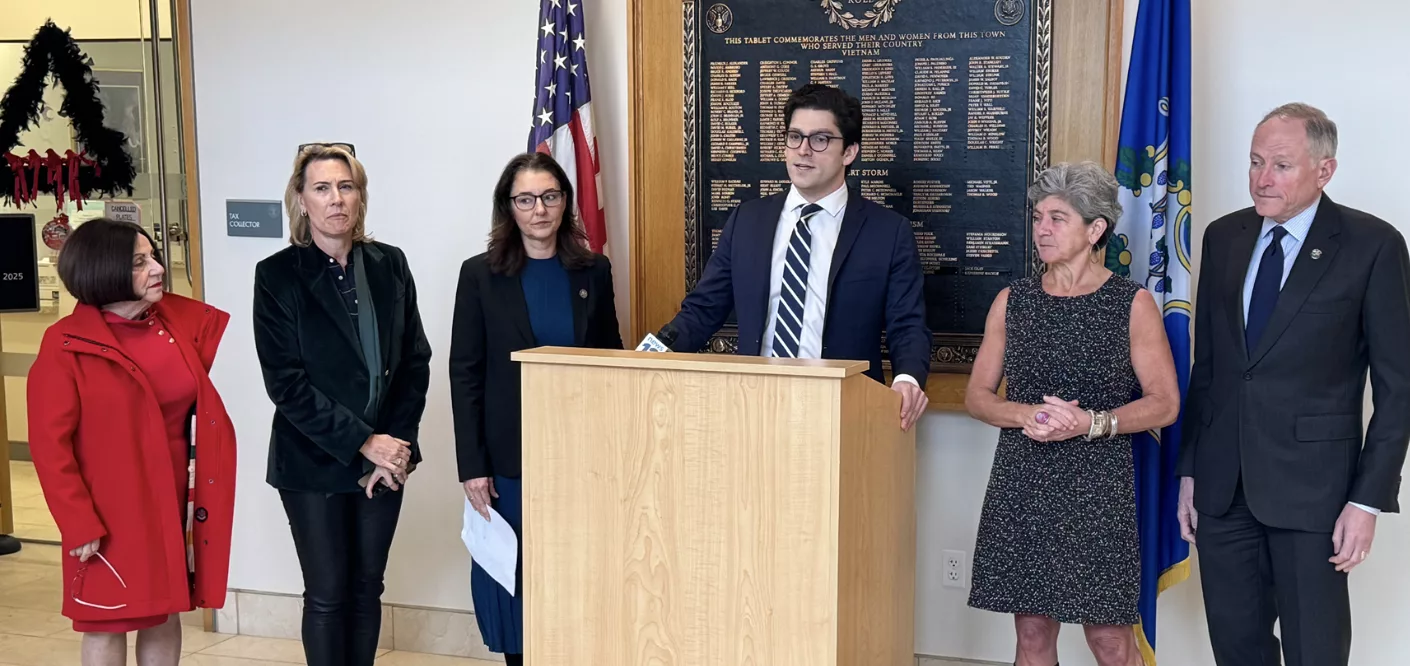
By Emma Barhydt
On January 27, Eversource Energy made official what many had suspected for months: the sale of Aquarion Water Company to a newly established, quasi-public entity known as the Aquarion Water Authority (AWA). Operating in tandem with the South Central Connecticut Regional Water Authority (RWA), the $2.4 billion deal—structured as $1.6 billion in cash and $800 million in debt—was presented as a strategic pivot by Eversource leadership.
“This transaction reinforces our commitment to our core electric and natural gas operations,” CEO Joe Nolan asserted in the company’s announcement. But for Connecticut residents and municipal leaders, the news only deepened growing anxieties. Since whispers of a potential sale began in July, critics had raised concerns about a major utility transaction unfolding largely out of public view. Now, with the deal on the brink of completion, questions linger: What would this shift mean for customers, and who would ultimately bear the financial burden?
State Senator Ryan Fazio, who represents New Canaan, Stamford and Greenwich, spoke at New Canaan’s Town Hall on Monday, February 3, on his concerns about the likely sale of Aquarion Water Company to the quasi-governmental, New Haven-based Regional Water Authority (RWA). Flanked by a bevy of First Selectmen and women – Dionna Carlson of New Canaan, Toni Boucher of Wilton, Jon Zagrodsky of Darien and Jen Tooker of Westport – as well as State Rep. Tracy Marra, who represents Darien and Norwalk, Sen. Fazio and the other dignitaries expressed their diverse distress about the potential adverse effects of such a sale on their communities.
Sen. Fazio led by noting that, “we know Connecticut residents already pay far too high utility rates across the board. This [sale of Aquarion to the RWA] will only potentially add insult to injury.” According to Sen. Fazio, an analysis by the Connecticut Office of Consumer Counsel found that customers of the RWA paid about 50% higher water rates than did similar Aquarion customers.
Aquarion Water Company’s rates are set and regulated by the Public Utilities Regulatory Authority (PURA), which is “the neutral adjudicator and watchdog for consumers,” said Sen. Fazio. The RWA will not have its rates regulated and set by PURA: they will be set internally by the RWA, which Sen. Fazio said, “is a potential concern for utility customers here as it will provide more upward pressure on prices.” Sen. Fazio further noted that the RWA also can charge consumers back the entire $2.4 billion purchase price, whereas another purchaser of Aquarion, “would only be able to charge back a smaller amount.”
Another worry of Sen. Fazio is the potential for, “underweight representation,” of the Aquarion customer base on the RWA’s Regional Water Authority Board, even though the Aquarion customer base is substantially larger than that in the RWA’s legacy area.
The process that facilitated this potential sale, which required legislative action in Hartford, was, in Sen. Fazio’s words, “one of the worst examples of governmental abuse that I’ve seen in my four years in office.” Sen. Fazio went on to say that, “we did not see the verbiage of the legislation until a couple of hours before we had to vote on it. As members of the Energy and Technology Committee, which has oversight over these issues, we had never heard of the policy proposal at all.”
Rep. Marra said, “this process has become deeply frustrating.”
New Canaan’s First Selectwoman Dionna Carlson expressed worry that, “our property taxes are likely to be significantly diminished,” by the change in ownership. This is because a private utility such as Aquarion pays property taxes, whereas the RWA does not. Most recently, Aquarion paid New Canaan around $375,000 in, “property taxes that we are entitled to from the company,” noted Carlson. The RWA will likely pay affected towns a PILOT (payment in lieu of taxes). However, the amount, and whether such an amount is fixed or subject to change, is not yet determined. Carlsoon was also concerned that the RWA would not support its infrastructure as well as Aquarion has, with implications for customer service quality. Remarked Carlson, “Aquarion was a great partner for our community, and I want to make sure that our customers … get the kind of service that they are entitled to.”
“The recent sale of Aquarion to Regional Water Authority still has not addressed the concerns I expressed when this issue first surfaced last year. I would hope their assurances that they stated last year about the pilot taxes and not raising rates for our residents will hold,” said Greenwich First Selectman Fred Camillo in a statement to the Sentinel regarding the sale. “Their public statements will now be scrutinized. I will certainly be following up on my previous concerns.”
First Selectwoman Jen Tucker of Westport remarked that the, “RWA runs a much more expensive operation [than Aquarion] and the governance over the operation is questionable. So I do believe it will lead to increased water prices, and that is absolutely something our residents cannot accept.”
Darien First Selectman Jon Zagrodsky noted that Aquarion has a strong service record – a record the RWA does not share. In addition, he suggested customers should take note of their current water bills, and compare them to those from the RWA if the deal goes through, and to “speak up.”
Wilton’s Toni Boucher stressed that the potential under-representation of the Aquarion customer base with the RWA would be, “absolutely biased and unfair.” She was also, “very concerned about the increase in costs,” that could affect her constituents.
Sen. Fazio and Rep. Marra, along with colleagues, are proposing to reform the oversight of the RWA, as well as to ensure that New Canaan and neighboring towns are “held harmless” financially by the sale of Aquarion.
As the sale of Aquarion Water Company moves through its final regulatory hurdles, local leaders remain resolute in their opposition, urging oversight agencies to scrutinize the deal’s financial and governance structure.
With PURA, as well as regulatory bodies in Massachusetts and New Hampshire, still required to approve the transaction, officials like Sen. Fazio, First Selectman Carlson, and their colleagues continue to call for transparency and consumer protections.
The stakes extend beyond rising water rates—impacting local tax revenue, service quality, and representation on the newly formed Aquarion Water Authority’s board.
Whether regulators intervene or the sale proceeds as structured, the debate over the deal’s fairness and long-term implications is far from over.


